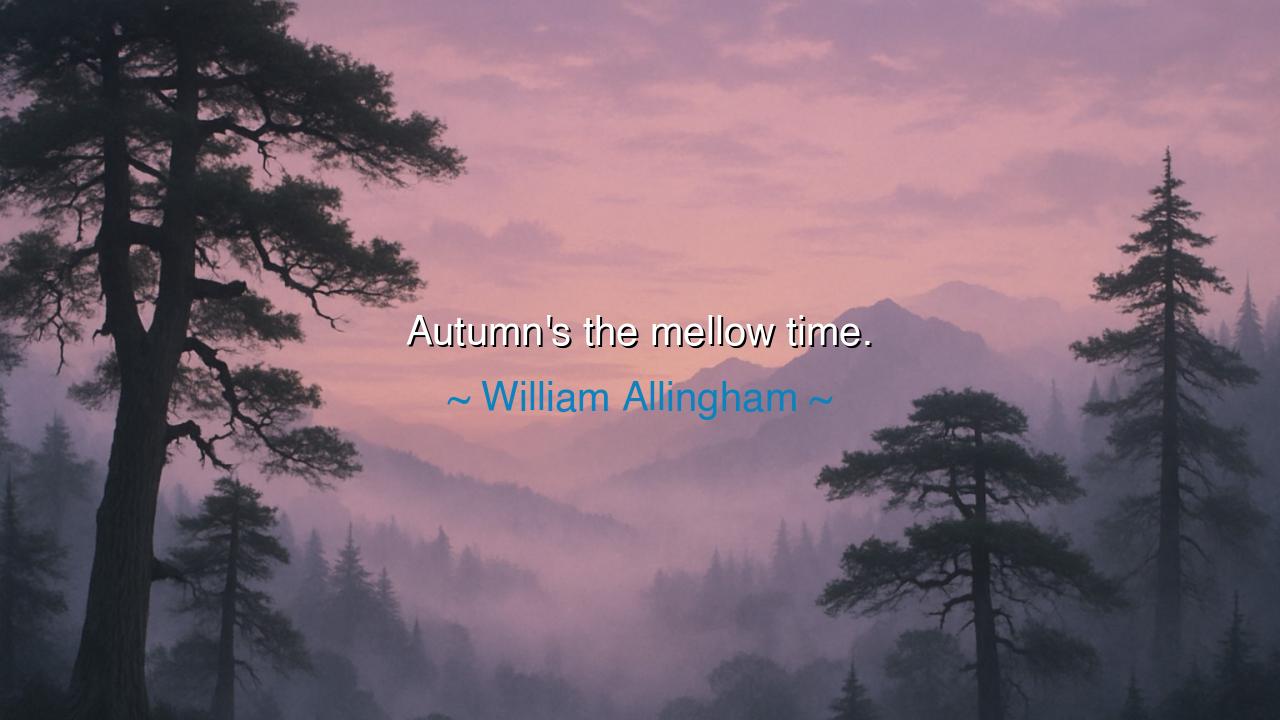
Autumn's the mellow time.






William Allingham, the Irish poet whose words often painted the quiet rhythms of life, once wrote with gentle truth: “Autumn’s the mellow time.” In these few words lies a wisdom that echoes through the ages: that the seasons of nature are mirrors of the seasons of the soul, and that autumn, with its golden light and soft decay, is the season of reflection, balance, and peace. Unlike the youthful vigor of spring or the burning strength of summer, autumn carries a mellowness — a ripened calm, where passion does not vanish, but settles into harmony.
The origin of these words comes not from a mere description of weather, but from the ancient rhythm of harvest. Autumn was the season when the year’s labor bore fruit, when the crops were gathered, when families saw the reward of toil. It was a time neither of beginning nor of ending, but of fulfillment. Allingham, in naming it the “mellow time,” honors this age-old truth: that life is not always meant to be a storm of striving. There are moments, earned through effort, when one must sit in the fading sun, breathe deeply, and find contentment in what has been gathered.
Consider the example of Marcus Aurelius, the philosopher-king. In the late years of his reign, though Rome was plagued by war and pestilence, he wrote words of calm and balance in his Meditations. His wisdom, composed in the autumn of his life, was not the fiery zeal of youth, but the tempered clarity of experience. Like the leaves that fall gently from the tree, his reflections carried no desperation, only acceptance. This is the mellowness of autumn: a wisdom that does not rage, but quietly endures, teaching by its serenity.
Yet autumn is not only gentle. It carries the whisper of mortality. The leaves that flame in beauty are the same that soon will wither. The air, soft and golden, carries the chill of coming frost. But this, too, is part of its gift. For autumn teaches us that endings can be beautiful, that decline can be dignified. To see the trees aflame is to learn that even in passing, there can be glory. The mellow time is not an escape from death, but a graceful preparation for it.
So the lesson is clear: in life, as in nature, there is a time for sowing, a time for striving, and a time for mellowness. Too often, men chase only the spring of novelty or the summer of achievement, fearing the calm that follows. But those who are wise know that the harvest is no less sacred than the planting. The soul, too, needs its season of reflection — to gather its fruits, to savor its blessings, to let go of what must fall.
What must we do, then? When autumn comes — in the year, or in our lives — do not resist it. Walk slowly among the falling leaves. Give thanks for what has been achieved. Spend time with those you love, for autumn is the season of gathering in not only harvest, but hearts. And when you feel the winds of change, do not clutch desperately at summer’s heat, but welcome the cool, for it carries its own peace.
In practical terms, learn to pause. After a great effort, rest. After a season of labor, celebrate. After years of striving, reflect. Take time to look upon your life as upon a harvest field: see what has grown, what has withered, and what seeds you may yet sow. For to live always in haste is to miss the mellow sweetness that autumn brings.
Thus, let Allingham’s words remain in your heart: “Autumn’s the mellow time.” They are not just about the turning of leaves, but about the turning of the soul. Embrace the season of calm when it comes, for in its golden light lies the wisdom of fulfillment, the beauty of endings, and the gentle strength to carry us into the winters of life with dignity and peace.






AAdministratorAdministrator
Welcome, honored guests. Please leave a comment, we will respond soon